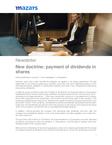
New doctrine: payment of dividends in shares
However, given that it often benefits the taxpayer, its legality is not always questioned. The last statements of the entity are particularly sensitive, since they may harm legitimate positions of the administered parties, adopted in a particularly sensitive time when many companies are decreeing extraordinary dividends.
In 2008, by means of Official Letter 220-0140624 of 06/18/2018, the Superintendence of Companies established that the shares issued to pay dividends should be issued for their nominal value, since - according to the Superintendence - if they were issued with a premium in the placement of shares, at the time of payment to the shareholder, such premium would remain again in the company. This reasoning, besides being wrong (since, otherwise, the capital increase by issuing shares at par value would also "remain" in the company), contradicts the judicial and arbitration postulates that have been forged over the last decade according to which the issuance of new shares must recognize the going value of the company, so that there are no unjustified shareholder dilutions.
In addition, nothing prevents the company from decreeing cash dividends, and then, after the company has recorded the liability in favor of its shareholders, the latter capitalize such credit, then, yes, with a premium.
Through Oficio 220-143915 of 10/18/2014, the Superintendence of Corporations recently reiterated its doctrine according to which the dividend, in corporations, could be paid in species other than released shares of the company itself.
Although this is interesting for tax planning purposes, since no tax impact is generated with the receipt of the good received as dividend, since it shall be recorded as an income not constituting income for the value of the dividend declared, this is in direct contradiction with the provisions of Article 455 of the Code of Commerce, which establishes that the dividend shall be paid in cash, and exceptionally in shares of the same company.
Finally, in Official Letter 220-180475 of 04/11/2014 the Superintendence of Companies established that a company that decreed a dividend payable in shares could not offset, with that account payable to the shareholder, debts that the same shareholder had with the company. It established that this was not legally possible because "this would mean that although the patrimony would increase to the extent that the liabilities of the company would disappear, it would not receive (sic) liquidity or an asset represented in money other than those already held by the legal entity".
This position, besides being erroneous (the decree of dividends decreases the equity, increasing the liabilities and, when paid, decreases the assets as a counterpart to the disappearance of the liabilities - never with the payment of dividends does an asset enter the company), is in violation of the provisions of Article 156 of the Code of Commerce, which establishes the informal compensation of the accounts payable as dividends with the accounts receivable that the company has with the shareholders.
Said rule specifically establishes that: "The profits distributed shall be paid in cash within the year following the date on which they are declared, and shall be offset with the amounts due from the shareholders to the company".


